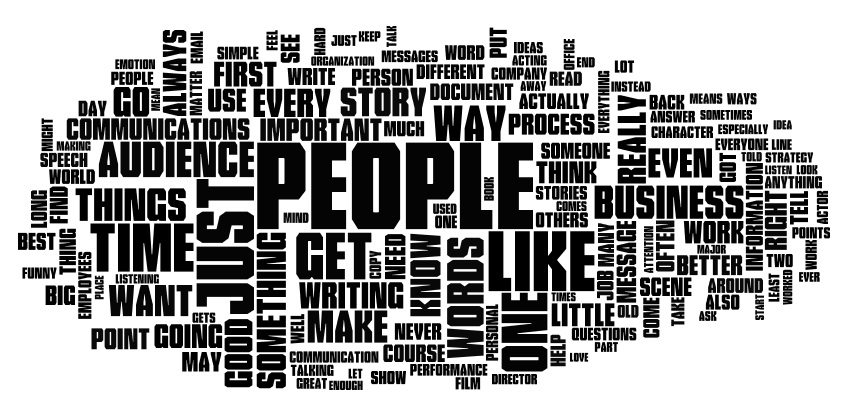I talked the other day about how writers squander their most powerful words and ideas by burying them. Just as bad is the opposite problem: growing overly fond and even dependent on certain words to the point we repeat them incessantly.
In the book I call them crutch words, and when you learn what yours are you’ll become incredibly self-conscious about using them.
I’m not talking about widely overused words like “basically,” or the most worn out and unwelcome words on the planet right now, “epic” and “fail.” I’m talking about the personal patterns or tics each of us exhibits — those words we become overly reliant on, to the point of possibly boring or annoying readers.
A great tool for figuring out your crutch words is the word cloud. I ran all 40,000-plus words of my book through the word cloud tool at wordle.net and came up with this:
When you look past the words that are specific and necessary to the subject you’re writing about, the results can be eye opening. For instance, I’ve long suspected that I overuse the word “just” (and was relieved to find I’m not the only one with this affliction) but it’s interesting to see the true dimension of the issue here.
I also use “like” quite a bit, often as a substitute for “such as” or in the service of analogies. Is it overkill?
What about the prevalence of “good” and “things?” Do these “vanilla” words signal a lack of creativity or an elegant, Hemingwayesque simplicity?
You can end up analyzing this to death, but I think it’s a good thing (there I go again) to be aware of the words you may be overly dependent on. You’ll start to catch yourself when you use them.
And if you’re aware of your crutch words you can monitor the problem by doing a quick search for them in whatever you’re writing.
What are your crutch words?
Related articles
- 9 Amazing Word Cloud Generators For The Classroom …Word Clouds in Education Series: Part 3 (21centuryedtech.wordpress.com)
- Discover Your Word Crushes: What Word Clouds Tell You About Your Writing (omnivoracious.com)

